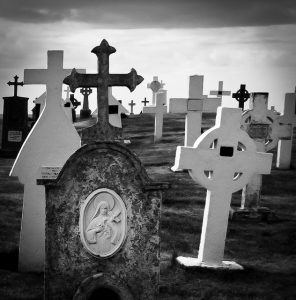American poet Langston Hughes once claimed that “life is for the living, death is for the dead, let life be like music. And death a note unsaid.” But what about a darker piece of music, a more sinister sound?

Musicians have been compelled to integrate the undead into their work for generations. From pop mainstays like Michael Jackson’s iconic “Thriller” to genres that thrive on the dark and sadistic, such as black metal, zombies are an element that music has not shied away from.
To understand why musicians glorify zombies, we must understand why the undead captivate our imaginations. To do so, we must understand why the concept of the zombie exists in the first place.
Society is meant to fear zombies. One possible explanation could be that the modern zombie represents what people fear most: becoming a brain dead and anonymous follower with no free will.
The zombie would therefore represent the death of our individuality. They also bring up the idea of mortality; the ultimate unsatisfying ending that all things living must meet.
Why would some of the most creative and individualistic members of the artistic community choose to conjure up such imagery?
Music has often confronted many of the most primal and relatable of themes: love, loss, freedom and of course, fear. By exploring what humans fear, musicians attempt to bring what is unfamiliar and uncertain to center stage. One needs only to look at Alice Cooper, Rob Zombie or Marilyn Manson to see entire musical careers based on the macabre as they attempt to walk—and sometimes completely step over—the line of the audience’s comfort level.
By making the majority of listeners uncomfortable, these three veterans found a whole following of those who already felt misunderstood and on the fringes of society.
Death has been approached in a wide variety of ways. From sad ballads about the passing of a loved one, perhaps like The Beatles’ “Yesterday,” to the uncertainty of life in its closing moments, such as “Searching for a Former Clarity” by Against Me!, songs about death can be written by artists for therapeutic reasons, in tribute to someone they lost or as a welcoming to what they believe awaits them after death.
“Music itself is an art about time, and every piece of music contains in itself the ineluctability of its ending,” said Georges Dimitrov, an assistant professor in Concordia’s Music department.
Music, like human life, must at some point come to an end. It is an art form that is inherently and constantly changing. A musician must accept the finality of their song and may choose to emphasize its ending to highlight its importance.
To use zombies in one’s work is to mock death itself by showing no fear in the face of limited time. By becoming what most people fear, these musicians transcend the mundane and enter the realm of the supernatural.




